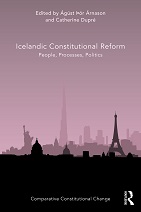Edited By Ágúst Þór Árnason, Catherine Dupré (Routledge 2020, 286 pages)
About the book
This collection documents, analyses, and reflects on the Icelandic constitutional reform between 2009 and 2017. It offers a unique insight into this process by providing first-hand accounts of its different stages and core issues. Its 12 substantive chapters are written by the main actors in the reform, including the Chair of the Constitutional Council that drafted the 2011 Proposal for a New Constitution.
Part I opens with an address by the President of the Republic and positions the constitutional reform in its full complexity and longer-term perspective, going beyond the frequent portrayal of that process in international discussion as being solely a result of the 2008 financial crisis. Part II offers a nuanced and contextualised reflection on Iceland’s innovative approach to consultation and drafting involving lay participants, including its twenty-first-century digital take on ‘the people,’ which attracted international attention as ‘crowdsourcing.’ Part III analyses the main constitutional amendment proposals, and focuses on natural resources and environmental protection, which lie at the heart of Iceland’s identity. The final part reflects on the reform’s wider significance and includes an interview with the current Prime Minister, who is now taking the reform forward.
The volume provides a basis for reflection on a groundbreaking constitutional reform in a democratic context. This long and complex process has challenged and transformed the ways in which constitutional change can be approached, and the collection is an invitation to discuss further the practical and theoretical dimensions of Iceland’s experience and their far-reaching implications.
About the series
Comparative Constitutional Change has developed into a distinct field of constitutional law. It encompasses the study of constitutions through the way they change and covers a wide scope of topics and methodologies. Books in this series include work on developments in the functions of the constitution, the organization of powers and the protection of rights, as well as research that focuses on formal amendment rules and the relation between constituent and constituted power. The series includes comparative approaches along with books that focus on single jurisdictions, and brings together research monographs and edited collections which allow the expression of different schools of thought. While the focus is primarily on law, where relevant the series may also include political science, historical, philosophical and empirical approaches that explore constitutional change.
